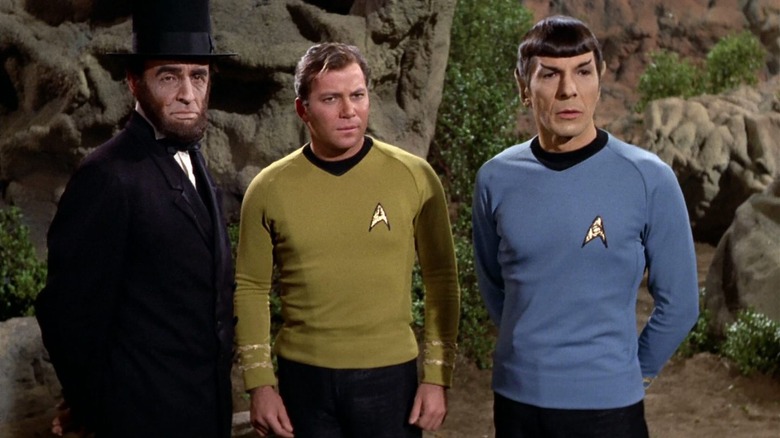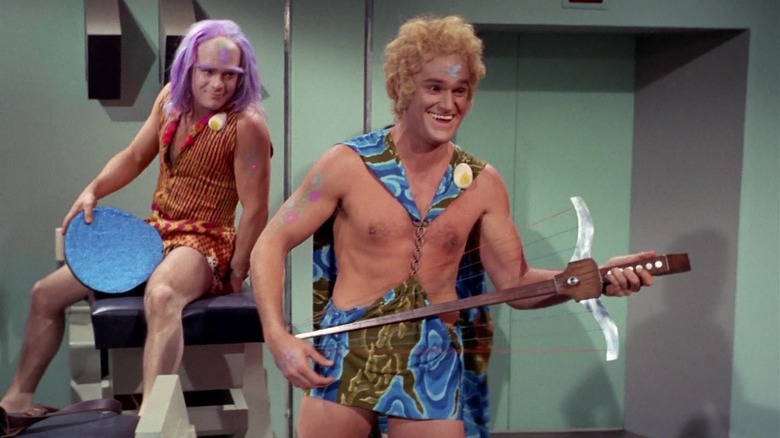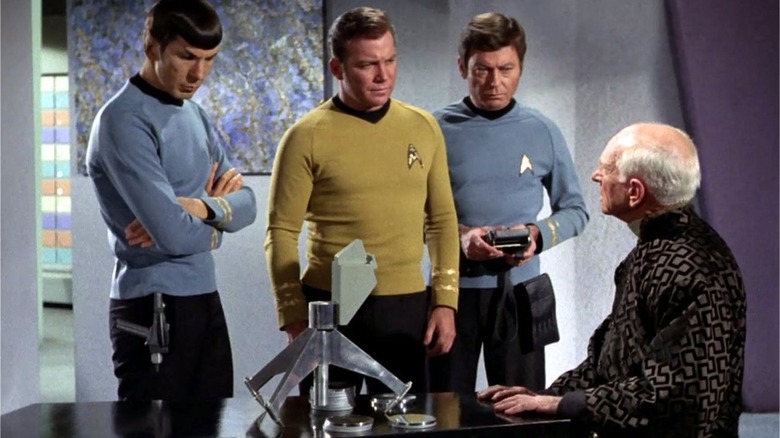NBC Accused Gene Roddenberry Of Master Manipulation In Pursuit Of Star Trek Season 3
As most readers probably know, "Star Trek" was rather unpopular during its initial run in 1966. It staggered through its three seasons, and in 1969, the show went off the air, presumably for good. Thanks to some pretty sweetheart syndication deals made after cancelation, however, reruns of "Star Trek" aired in most markets throughout the 1970s. It was during this time that its cult began to grow. In January of 1972, the very first "Star Trek" convention was held in New York, and the show's legend was sealed. Show creator Gene Roddenberry would frequently appear at these conventions to talk with fans and discuss the show's philosophy. It was during these lectures that Roddenberry and the fans, kind of working together, began to properly make a record of Trek's utopian ideals. It wouldn't be until the development of "Star Trek: The Next Generation" almost 20 years later that a purer version of Roddenberry's vision would make it to the screen.
Of course, audiences may have been treated to that vision years earlier. Naturally, Roddenberry didn't want "Star Trek" to go off the air in 1969; he was proud of his show and wanted it to be successful. But it seems ratings were low, costs were high, and NBC didn't care; the studio's executives thought disparagingly that "Star Trek" was for 12-year-olds. By the end of the second season, it was pretty clear that "Star Trek" was doomed.
According to the book "The Fifty-Year Mission: The Complete, Uncensored, Unauthorized Oral History of Star Trek: The First 25 Years," edited by Edward Gross and Mark A. Altman, Roddenberry rallied what few fans the show had and — like in "Mr. Smith Goes to Washington" — sparked a grassroots letter-writing campaign to save the show.
NBC hated that.
The writing on the wall
The fans who spearheaded the campaign were named Bjo and John Trimble, a married couple who met via the fan communities of Forrest J Ackerman, and a pair of savvy Trekkies who felt "Star Trek" was great from the start. The early days of fandom were a low-rent affair, and fanzines had to be printed at home by enterprising writers who had access to printing presses. Luckily the Trimbles had such equipment. They also knew — through the grapevine — that ratings were flagging on Roddenberry's show. The pair rallied and authored a chain letter. As they describe it:
"Cancelation was certain at the end of the second season. We wrote up a preliminary letter, ran it off on our ancient little mimeograph machine, and mailed it out to about 150 science fiction fans. We didn't have enough money to have a letter printed, so we used the Rule of Ten: Ask ten people to write a letter and they ask ten people to write a letter, and each of those ten asks ten people to write a letter."
Early fandom, it should be noted, was mostly achieved via mail back in the 1960s. Fans would indeed gather at conventions, and those in Los Angeles could kibbitz with Ackerman (the founder of "Famous Monsters of Filmland"), but many fans could only communicate their passions in the public forums of sci-fi magazine letters sections. As such, nerds were quite used to physically writing down their dissent and mailing it to an office somewhere. That energy was directed at NBC, a studio that clearly underestimated its audience.
The cretins who watch 'Star Trek'
The Trimbles knew how NBC viewed "Star Trek," saying:
"NBC was convinced that 'Star Trek' was watched only by drooling idiot 12-year-olds. They managed to ignore the fact that people such as Isaac Asimov and a multitude of other intellectuals enjoyed the show. So, of course, the suits were always looking for reasons to cancel shows they didn't trust to be a raging success."
It was a woman named Elyse Rosenstein who first started organizing "Star Trek" conventions in the early 1970s. Fan cons would not exist the way they do today without her efforts. It was Rosenstein — who passed away in 2020 — who had the skinny on the power of the letter-writing campaign. Evidently, the Trimbles' efforts were overwhelmingly effective, as NBC received twice the volume of mail than they got on all their other shows combined. Rosenstein said:
"Do you realize how many pieces of mail NBC eventually received on 'Star Trek?' They usually got about 50,000 for the year on everything, but the 'Star Trek" campaign generated one million letters. They were handling the mail with shovels—they didn't know what to do with it. So they made an unprecedented on-air announcement that they were not canceling the show and that it would be back in the fall."
Sadly, if there is video footage of the announcement somewhere, it cannot be located online.
The person most shocked by the success of the letter-writing campaign was Roddenberry himself. Indeed, the letters were so effective, some of the muckety-mucks at NBC began to suspect that Roddenberry himself had something to do with it. In print, he assures readers that he did not, but that didn't assuage suspicions.
Roddenberry, you imp!
It seems it wasn't until the campaign that Roddenberry first understood how passionate and widespread "Star Trek" fans really were. He said:
"The letter-writing campaign surprised me. What particularly gratified me was not the fact that there was a large number of people who did that, but I got to meet and know 'Star Trek' fans, and they range from children to presidents of universities."
A lot of scientists and college students watched "Star Trek," finding its distant adherence to scientific ideas — a novelty in sci-fi TV at the time — immensely appealing. The California Institute of Technology, aka Caltech, seems to be a flashpoint for the most fan letters in 1968. Thanks to the push from such a wide swath of fans, and the organizational efforts of the Trimbles, "Star Trek" was revived.
Of course, that didn't stop the NBC execs from looking at Roddenberry askance. How many of those letters did he write himself, they wondered? It turns out, none. Roddenberry says that he wishes he had that sort of influence. In his words:
"We won the fight when the show got picked up for a third season. NBC was certain I was behind every fan, paying them off. And they finally called me up and said, 'Listen, we know you're behind it.' And I said, 'That's very flattering, because if I could start demonstrations around the country from this desk, I'd get the hell out of science fiction and into politics.'"
The third season of "Star Trek," sadly, didn't do too well either, and many Trekkies agree that some of the show's weakest episodes came from that year (the budgets are clearly much lower as well).
But it lived. And it lives on to this day.



